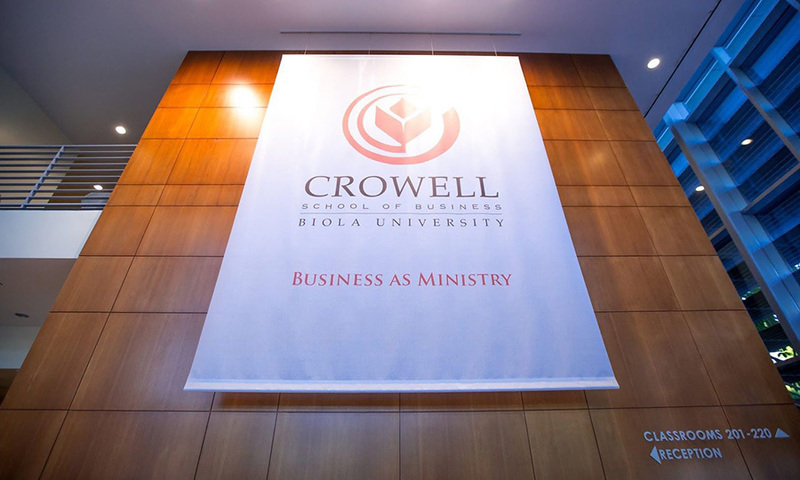Therefore, my beloved brothers, be steadfast, immovable, always abounding in the work of the Lord, knowing that in the Lord your labor is not in vain. - 1 Corinthians 15:58
As a Crowell School of Business student, you may often hear or see the phrase, “Business as Ministry.” In fact, if you physically visit our building, you’ll see it proudly featured on a huge banner in the lobby. We consider it a foundational cornerstone of our school identity to the extent that it is central to our bachelor’s degree in business management, which is: “To equip adult students to complete the calling God has given them to practice business as ministry.” So what exactly is business as ministry and why is it such an important concept?
Model of Ministry
Biola professor Klaus Issler defines Business as Ministry as, “Christians seeking God’s kingdom values and the common good through a good job within any sector,” whether that be government, for profit, or not-for-profit. In Issler’s article, “Jesus at Work: Why ‘Secular’ Jobs aren’t for Second-Class Christians,” he further breaks down business as ministry into a three-part model:
- A ministry at work: Pointing those around us to God.
- A ministry of work: Serving and creating.
- A ministry to work: Redeeming practices, policies, structures, and relationships.
A ministry at work might look like explicit evangelism, or it might look like working and living above reproach and positively affecting your community and society by your actual work, with the motivation to show that Jesus is real in your life.
The way we use our strengths, giftings and creativity in work is the second part of the model, a ministry of work. In fact, using our talents can be a part of being filled by the Holy Spirit. Exodus 35:31 and 36:2 talk about a less familiar biblical figure, Bezalel. He wasn’t a preacher or other full-time ministry worker. In fact, he was a craftsman, and the Bible tells us that his “work-place” skills and knowledge were from the Lord.
Ministry of work is also a way in which our identity as children of God is expressed. We are made in God’s image and share his attributes, or characteristics, such as creativity, wisdom, appreciation of beauty and planning for the future among other things that are all a part of our work-life.
Lastly, a ministry to work references how we seek to redeem things in every area of our lives and leave them better than we found them. We engage with culture and the world through our work in order to impact and transform the world as part of our calling as Christians.
Breaking Stereotypes
Why the big focus on defining a theology of business as ministry? Year after year, we hear from our first-year students that they fear by choosing business as a vocation, they are less valuable as Christians than a full-time ministry worker such as a pastor or missionary. They might have been asked, “Why go to a Christian university for a business degree?”
Stereotypes abound that all business people are greedy, workaholics or corrupt, and the false idea persists that there is an invisible barrier between our day-to-day “secular” life and our Sunday “sacred” life. But our work matters in our character formation and Christians who choose a non full-time ministry vocation don’t get an easy out from the Great Commission. We are all ministers of the gospel whether our job title reflects that or not.
Business as ministry is an outworking of becoming a more whole person and Christian as we seek to daily submit more of the entirety of our lives to the Lord. We aim that at the close of your time at Crowell, you are able to look back and see that you internalize and practice this more fully than when you started.
“We too often forget that the thing we spend 40+ hours a week doing is a major part of God’s purpose for our life. Our profession is a ministry, and a form of worship,” states professor Steve Rundle.
Resources:
- Business as Ministry by Crowell Dean Lindblad, Ed.D.
- The Compatibility of Workplace and Ministry (VIDEO) - Open Biola
- Theology of Work Project
 Biola University
Biola University




.jpg)